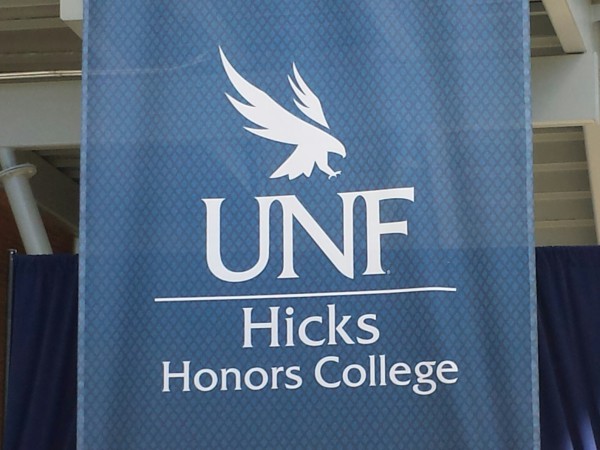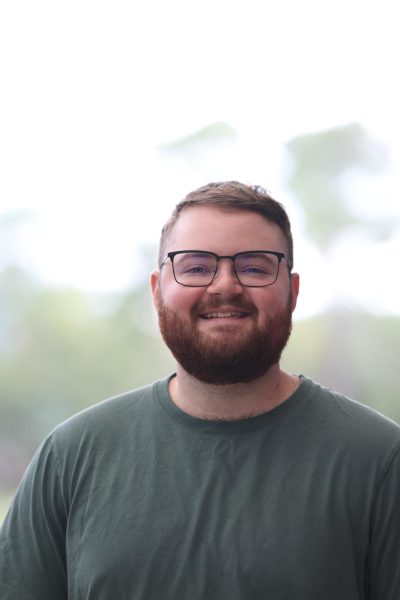This article expresses the views of its author(s), separate from those of this publication. Readers are encouraged to comment or submit a Letter to the Editor to share their opinions. To submit a Letter to the Editor, follow the instructions here.
Before I begin, I have to drop some Ethan lore: I have been a part of the University of North Florida’s Hicks Honors College since my freshman year.
I went to preparatory school for my middle and high school years, where brain surgeons and NBA players send their kids (I was on varsity archery with Joey Fatone’s daughter—true story).
By all accounts, I was (and still am) a pretty average student—As and Bs, some semesters with more Bs than As. I even ended Algebra II with a C+ in my sophomore year. Sure, I had taken seven AP courses, been a part of the school newspaper and played a varsity sport all four years, but I wasn’t exactly showing signs of becoming the next Elon Musk.
At my school, you were behind if you didn’t own a business before you could vote.
So, when my senior year rolled around, and college applications became the bane of my existence, I applied to Hicks on a whim, expecting to be rejected just like all the other honors programs I applied to.
Well, you already know what happened, and I was pretty surprised to see an acceptance email in my inbox.
My first year in the Honors Program was excellent. I lived in the Honors LLC, where I met most of my current friends. We had Honors-specific advisors for freshmen. I took Self and Society with Dr. Jeffrey Chamberlain, the current dean of the Hicks Honors College. I attended many interest group meetings and got further involved in the program.
I felt like I was part of a tight-knit community the whole year. Even when my required first-year courses ended, I was surrounded by other honors students daily. As a natural introvert, this made the social and even academic aspects of college much more accessible.
But then something changed. After my first year, Honors became just another list of requirements for graduation.
We no longer had Honors-specific advising. My friends and I scattered in housing across campus and got deeper into our majors. Some of them even dropped out of the program entirely.
Communication from the college became less and less, consisting of only the newsletter and capstone reminders. It was honestly shocking how quickly the sense of community fell apart.
As of this semester, I am now a senior in the Hicks Honors College. With a few years under my belt, I’ve had time to think about how UNF, the Honors Program and its students can improve the honors experience.
Here are three things that UNF and the Hicks Honors College can work on to improve the upperclassmen experience.

Honors-specific advising for upperclassmen
I cannot stress enough how helpful this would be for honors students beyond their first year. There are so many criteria, from the minimum credits to GPA and the ever-perplexing upper-level requirements, that students must meet before they can be eligible for graduation.
So many students don’t get involved with the program or drop out because they feel overwhelmed by the requirements and their options to complete them. Sure, the Honors office has drop-in hours, but there’s still no guarantee that you’ll get answers to your questions.
An advisor could help me with those upper-level requirements, recommend courses or other programs that benefit me and keep me on track for graduation. Simply put, DegreeWorks shouldn’t be my only source of information for the Honors curriculum.
Honors-specific housing for upperclassmen, too
To be clear, I know that UNF has started construction on an Honors residence hall (it shouldn’t have been UNF’s first new housing development in a decade, but that’s another story).
One of the Hicks Honors College’s most significant selling points is being able to live with other Honors peers for the first year. After freshman year, though, all the community-building that happened in the last year falls by the wayside, mainly because honors students no longer have a widely used and shared living space.
Yes, there’s the Global Honors LLC, but even that community isn’t Honors-exclusive and is sparsely populated (and it’s in Fountains—no thanks). Allowing upperclassmen to live with like-minded peers beyond their first years will help continue the community building that happened in previous years.
Change the mindset around collegiate learning
This wouldn’t be an Ethan Leckie opinion piece without a vague, mildly thought-provoking concept.
Before I began writing, I spoke with Dr. Leslie Kaplan, director of the Hicks Honors College. We discussed how Honors is for students who want to have learning experiences beyond the surface-level comprehension of most college classes.
However, to a certain extent, we agreed that this approach contrasts sharply with the box-checking that most college courses tend to be designed for. Unfortunately, this is one of the biggest reasons Honors falls by the wayside after a student’s freshman year.
College (at least for UNF) is structured so that students who graduate have completed specific tasks in a particular order to be certified to work in whatever profession they have obtained a degree for. In other words, the typical college experience is like a factory, and Honors is more akin to an artisan workshop.
The participation in the learning process expected from Honors students requires a level of time and effort that our major tracks aren’t equipped to accommodate. The interdisciplinary approach of Honors is challenging when the rest of collegiate academics are designed for specialization.
These three things won’t solve everything, but I think they’re an excellent start for the Hicks Honors College.
I believe that Honors is what its students make of it. There are plenty of ways to get involved within the program, and I think there will be some improvements with the new Honors-specific residence hall.
Providing more support for upperclassmen will keep students in the program and produce the well-rounded graduates UNF prides itself on.
Being a part of the Hicks Honors College has helped me tremendously in my social, academic and professional lives, and I want to see this program help the cohorts that come after me.
___
For more information or news tips, or if you see an error in this story or have any compliments or concerns, contact editor@unfspinnaker.com.













Kai Edu | Feb 29, 2024 at 4:45 pm
As someone who transferred into Honors last summer, one of the first things I noticed was how heavily it was marketed (and, to some extent, designed) for freshmen.